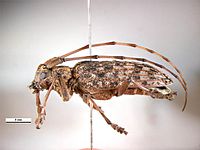
Photo from wikipedia
Monochamus alternatus is a major forest pest that spreads pine wilt disease in pine trees as a vector of pine wilt nematodes. Chemical insecticides used as fumigants to control overwintering… Click to show full abstract
Monochamus alternatus is a major forest pest that spreads pine wilt disease in pine trees as a vector of pine wilt nematodes. Chemical insecticides used as fumigants to control overwintering M. alternatus in forests are highly toxic to the environment, so we investigated entomopathogenic fungus Beauveria bassiana ERL836 as an eco-friendly and alternative material to control overwintering M. alternatus. In this work, we evaluated the insecticidal activity of B. bassiana ERL836 against M. alternatus adults, the possibility of fungal colonization on pine tree bark, and finally the control efficacy of fungal pre-treatment on pine tree logs against emerging M. alternatus adults in semi-field and field conditions. M. alternatus adults were killed on the pine tree logs pre-treated with the B. bassiana ERL836. White conidia were observed not only on the surface of the dead adults but also on the pine tree logs, suggesting that the adults were killed by the fungus on the pine. A formulated ERL836 powder treatment on larvae-infested pine logs showed high insecticidal activity against adults, similar to that with the fungal powder suspension treatment, but we demonstrated that using the fungal powder was simpler than using the suspension in field conditions. Even in the field condition, the fungal powder treatment showed high insecticidal activity against M. alternatus adults, which we attribute to its ability to maintain fungal activity for a long time in field conditions by covering the pine tree logs with a film during overwintering. We confirmed that the risk that fungus-infected M. alternatus adults would spread the fungus to other non-target forest insects was low. Thus, even a high-concentration treatment in a specific area is unlikely to transmit the fungus outside that area, so it can be safely used to control this pine wilt nematode vector in forest ecosystems.
Journal Title: PLoS ONE
Year Published: 2022
Link to full text (if available)
Share on Social Media: Sign Up to like & get
recommendations!